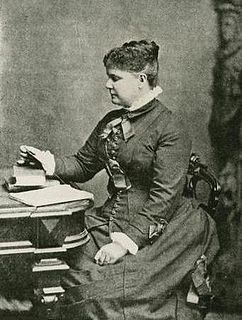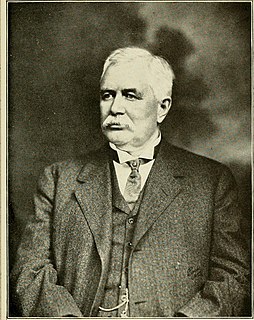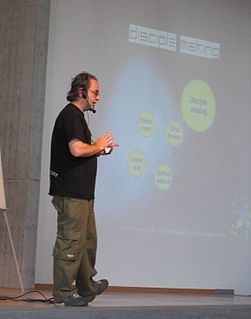Top 261 Planting Quotes & Sayings - Page 5
Explore popular Planting quotes.
Last updated on December 18, 2024.
As he rounded the corner, he saw two dozen men, naked to the waist, digging a hole thirty yards square at the side of the path. For a moment he was baffled. It seemed to have no agricultural purpose; there was no more planting or ploughing to be done. Then he realized what it was. They were digging a mass grave. He thought of shouting an order to about turn or at least to avert their eyes, but they were almost on it, and some of them had already seen their burial place. The songs died on their lips and the air was reclaimed by the birds.
Any fool can destroy trees. They cannot run away; and if they could, they would still be destroyed,-chased and hunted down as long as fun or a dollar could be got out of their bark hides, branching horns, or magnificent bole backbones. Few that fell trees plant them; nor would planting avail much towards getting back anything like the noble primeval forests. During a man's life only saplings can be grown, in the place of the old trees-tens of centuries old-that have been destroyed.
'Tis sorrow builds the shining ladder up, Whose golden rounds are our calamities, Whereon our firm feet planting, nearer God The spirit climbs, and hath its eyes unsealed. True it is that Death's face seems stern and cold When he is sent to summon those we love; But all God's angels come to us disguised; Sorrow and sickness, poverty and death, One after another, lift their frowning masks, And we behold the Seraph's face beneath, All radiant with the Glory and the calm Of having looked upon the front of God.
The mode of clearing and planting is to fell the trees, and burn once what will burn, then cut them up into suitable lengths, rollinto heaps, and burn again; then, with a hoe, plant potatoes where you can come at the ground between the stumps and charred logs; for a first crop the ashes suffice for manure, and no hoeing being necessary the first year. In the fall, cut, roll, and burn again, and so on, till the land is cleared; and soon it is ready for grain, and to be laid down.
We seem so frightened today of being alone that we never let it happen. Even if family, friends, and movies should fail, there is still the radio or televsion to fill up the void... We can do our housework with soap-opera heroes at our side... Now instead of planting our solitude with our own dream blossoms, we choke the space with continuous music, chatter, and companionship to which we do not even listen. It is simply there to fill the vacuum. When the noise stops there is no inner music to take its place. We must re-learn to be alone.
The federal government, state governments will not do without that tax revenue from tobacco no matter what. I've always thought it was one of the most contradictory setups that we have, because everything said publicly about the product is intended to besmirch it, impugn it, and do the same thing to the people that use it. And yet here's the government scoring, I mean, you want to talk about obscene profits, the government doesn't do a damn thing but stick its hand in. The government taxes tobacco at every stage. It taxes tobacco when the farmer's thinking about planting it.
A gift is like a seed; it is not an impressive thing. It is what can grow from the seed that is impressive. If we wait until our seed becomes a tree before we offer it, we will wait and wait, and the seed will die from lack of planting.... The miracle is not just the gift; the miracle is in the offering, for if we do not offer, who will?
Modern anthropology ... opposes the utilitarian assumption that the primitive chants as he sows seed because he believes that otherwise it will not grow, the assumption that his economic goal is primary, and his other activities are instrumental to it. The planting and the cultivating are no less important than the finished product. Life is not conceived as a linear progression directed to, and justified by, the achievement of a series of goals; it is a cycle in which ends cannot be isolated, one which cannot be dissected into a series of ends and means.
When I look out the window, I exhale a prayer of thanks for the color green, for my children's safety, for the simple acts of faith like planting a garden that helped see us through another spring, another summer. And I inhale some kind of promise to protect my kids' hopes and good intentions we began with in this country. Freedom of speech, the protection of diversity - these are the most important ingredients of American civil life and my own survival. If I ever took them for granted, I don't know.
Of all the wonderful things in the wonderful universe of God, nothing seems to me more surprising than the planting of a seed in the blank earth and the result thereof. Take that Poppy seed, for instance: it lies in your palm, the merest atom of matter, hardly visible, a speck, a pin's point in bulk, but within it is imprisoned a spirit of beauty ineffable, which will break its bonds and emerge from the dark ground and blossom in a splendor so dazzling as to baffle all powers of description.
The primary purpose of the Legislature in establishing "Arbor Day," was to develop and stimulate in the children of the Commonwealth a love and reverence for Nature as revealed in trees and shrubs and flowers. In the language of the statute, "to encourage the planting, protection and preservation of trees and shrubs" was believed to be the most effectual way in which to lead our children to love Nature and reverence Nature's God, and to see the uses to which these natural objects may be put in making our school grounds more healthful and at-tractive.
It's promising and seductive, that huge Italian family, sitting around the dinner table, surrounded by olive trees. But it's not my family and I am not their family, and no amount of birthing sons, and cooking dinner and raking leaves or planting the gardens or paying for the plane tickets is going to change that. If I don't come back in eleven months, I will not be missed, and no one will write me or call me to acknowledge my absence. Which is not an accusation, just a small truth about clan and bloodline.
Our ingenuity in feeding ourselves is prodigious, but at various points our technologies come into conflict with nature's ways of doing things, as when we seek to maximize efficiency by planting crops or raising animals in vast mono-cultures. This is something nature never does, always and for good reasons practicing diversity instead. A great many of the health and environmental problems created by our food system owe to our attempts to oversimplify nature's complexities, at both the growing and the eating ends of our food chain.
Men swagger around calling themselves "cattlemen" but abuse their grass like a rapist. And abuse their cattle with concrete fecal feedlots without any regards to rumen function. Vegetable growers plow thousands of acres, planting monocrops of annuals in a never-ending tillage routine that totally annihilates carbon wealth. Why? Why are we so enamored of things that destroy carbon and disrespect the animals under our care? Grass. Lowly grass. It just gets no respect. And yet it is the lifeblood of the planet.
I do not believe that our relationship to the earth is liable to change for the better until it gets catastrophically worse. Our record indicates that we can walk with our eyes wide open straight into sheer destruction if there is a profit on the way-and that seems to me to be what we are doing now. I have no great expectation that human cussedness will somehow be quickly modified and turned into generosity or that humanity's care of the earth will improve much. But I do go around planting trees on the campus.
But she still had that something which fires the imagination, could still stop one's breath for a moment by a look or gesture that somehow revealed the meaning in common things. She had only to stand in the orchard, to put her hand on a little crab tree and look up at the apples, to make you feel the goodness of planting and tending and harvesting at last. All the strong things of her heart came out in her body, that had been so tireless in serving generous emotions. It was no wonder that her sons stood tall and straight. She was a rich mine of life, like the founders of early races.
The formation of character in young people is educationally a different task from, and a prior task to, the discussion of the great, difficult, ethical controversies of the day. First things first. And planting the ideas of virtue, of good traits in the young, comes first. In the moral life, as in life itself, we take one step at a time. Every field has its complexities and controversies. And so does ethics. And every field has its basics. So too with values.
Whether [new Protestant church movements] place their emphasis on new worship styles, expressions of the Holy Spirit’s power, evangelism to seekers, or Bible teaching, these so-called new movements still operate out of the fallacious assumption that the church belongs firmly in the town square, that is, at the heart of Western culture. And if they begin with this mistaken belief about their position in Western society, all their church planting, all their reproduction will simply mirror this misapprehension.
So if waiting is an aggravation, it is at least partly because we do not like being reminded of our limits. We like doing -- earning, buying, selling, building, planting, driving, baking -- making things happen, whereas waiting is essentially a matter of being -- stopping, sitting, listening, looking, breathing, wondering, praying. It can feel pretty helpless to wait for someone or something that is not here yet and that will or will not arrive in its own good time, which is not the same thing as our own good time.
In Crash, you've got a pathological cop who at the end justifies police brutality. He tells the naïve, young cop that you're going to end up the same as him. He's the most sympathetic character in the movie. So, the naïve cop ends up murdering this Black kid and tries to cover up the evidence. It sort of justifies police brutality and the planting of evidence which is what happened in the O.J. Simpson case.
Feelings, whether of compassion or irritation, should be welcomed, recognized, and treated on an absolutely equal basis; because both are ourselves. The tangerine I am eating is me. The mustard greens I am planting are me. I plant with all my heart and mind. I clean this teapot with the kind of attention I would have were I giving the baby Buddha or Jesus a bath. Nothing should be treated more carefully than anything else. In mindfulness, compassion, irritation, mustard green plant, and teapot are all sacred.




















